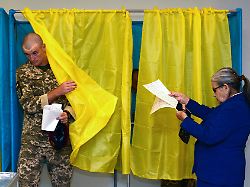Internationally required to hold
Majority of Ukrainians oppose wartime elections
October 30, 2023, 4:24 p.m
Listen to article
This audio version was artificially generated. More info | Send feedback
According to the law, parliamentary and presidential elections should actually be held in Ukraine. However, current martial law prohibits this. According to a survey, 81 percent of Ukrainians do not want to go to the polls again until the war is over.
A majority of Ukrainians have voted in polls against holding elections during Russia’s war of aggression. According to a publication by the Kiev International Institute of Sociology, 81 percent of Ukrainians surveyed are in favor of elections only after the end of the war. Only 16 percent of those surveyed were in favor of holding parliamentary and presidential elections in accordance with the deadlines set out in the constitution.
Previously, in a Rating Group survey, 62 percent also spoke out against wartime elections. A little more than 30 percent believed that going to the polls was necessary, even if the war was ongoing. The background is that regular parliamentary elections should have taken place last Sunday according to the Ukrainian constitution. However, the current martial law does not provide for elections. According to the constitution, regular presidential elections should actually take place on March 31 next year.
Internationally, Kiev had been repeatedly called upon to hold elections. However, Ukrainian politicians have so far rejected changes to the law – citing problems with election organization. It is unclear how a normal election campaign can be organized under martial law and how all eligible voters can participate given the millions of refugees at home and abroad. After the Russian invasion, martial law was declared across the country in February last year.
President Volodymyr Zelensky has been in office since May 2019. The parliament, elected in July 2019, met for the first time at the end of August of the same year. Both surveys were conducted by telephone in early October among at least 2,000 adult Ukrainians within the country. The statistical margin of error was stated to be a maximum of 2.4 percent.
